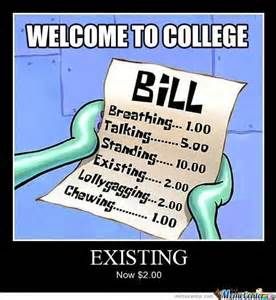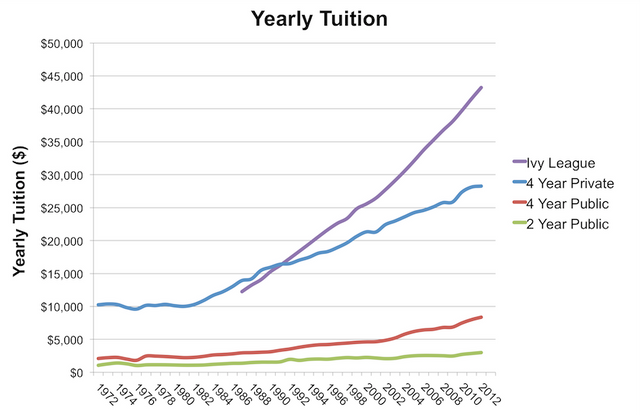Why Going To College Is No Longer A Smart Career Choice

For those of you who support college education, then you're no doubt thinking, “Why you hatin' on college, man?”
For those of you who could take it or leave it are probably thinking, “Well, Bill Gates, Steve Jobs, and Mark Zuckerberg never went to college and look how they turned out. I'll be fine.”
For years, students who entered the workforce immediately after high school were often labeled lazy and people expected they would never exceed anything above fast food or cashier clerk status—forever making minimum wage or close to it. Comparatively, students who earned a college degree were believed to receive a quality job, make good wages, and possibly retire with a pension.
However, those days are long gone, and college isn't as sensible of a career choice as it once was. Read on to see why.
The Cost of College Tuition is Astronomical
The biggest and most obvious drawback in enrolling into college is the cost, and it's only getting more expensive. In 2005, the average cost for college tuition was just over $17,000. Today, students can expect to pay an average of $44,000 for the same education—that's a 265% increase in the last twelve years! On the other hand, annual wages have only increased an average of 20% in the last fifteen years—hardly enough to keep up with the rising costs of college tuition. When we take into considering of a devaluing currency and inflation, people are actually earning less today even though their paychecks display a higher figure than they did ten years ago. Now, let that fact sink in for a moment.

So going to college pretty much guarantees that you'll be paying off those student loans until age 40, possibly living in mom's basement, as you endlessly seek for a decent job, while waving around your Masters degree that no one is interested in.
Field Experience Always Trumps Classroom Experience
Okay, I say “always”, which may be stretching the word just a smidge, but there's no denying that employers love to hire new blood that don't need a lot of training, if any, out of the gate.
For instance, let's say you're the GM for a high-end steakhouse and you're in dire need of a chef that knows the difference between a boner knife and a paring knife, but can also prepare the perfect filet mignon in his sleep. Are you going to hire someone with four years of education in the culinary arts, but has no prior field experience, or are you going to hire someone who's been the head chef at a fellow steakhouse for the last two years?
My point: experience trumps book knowledge these days. That's not to say every field agrees with this perspective, law firms and the medical industry could be an exception, as well as quite a few others, but there's no denying that employers love to see a broad portfolio over a college degree when considering a candidate for hire.
We'd Rather Work For the Man Than Work For Ourselves
Dale Partridge, Founder and CEO of startupcamp.com, made a great statement in his article on this very subject, “Shockingly, many of us will take a $100,000 in debt in hopes for a career, where we could be fired any day, over taking a loan for $10,000 to try to launch their own business. Sounds crazy, right?”
The biggest problem colleges across the globe are facing is being incapable of keeping up with the fast-pace trends of the various business industries, meaning, they aren't able to create entirely worthwhile curriculum for such programs because by the time they create said curriculum, that industry has greatly changed once again and such curriculum is likely, at least partially, to be obsolete.
So What's the Answer
We still have many options available to us. Crash course colleges, also commonly called “education boot camps” are growing more and more popular. The concept of boot camps is to provide college level curriculum, minus the degree. The advantages of boot camps is you learn the necessary skills to acquire a career in that field and they are typically a fraction of the cost of regular colleges, while they can usually be completed in under six months—less time spent in the classroom means significantly fewer student loans.
Aside from boot camps, we are seeing more entrepreneurs taking a chance and starting their own business. People always fascinate over being their own boss, constructing their own work hours, and generally earn higher wages than they would working for someone else. I believe the main reason we don't see more small business owners is because people continue to believe the only way to acquire a good career is to go to college, while also being fearful their solo endeavors may fail. Sometimes taking chances turns out to be well worth it.
Whether you're finishing up high school or have been in the workforce for a long while, if you're considering returning to school, think long and hard before enrolling into college—there may be better options available to you.
If you enjoyed this post, hit that Upvote button and Follow me @troydearbourne for more posts just like this one.
 !
!
Online courses can benefit people greatly and I think will either push or kill many traditional state colleges.
@mschwery I agree. Over the next five years, I look for online education to increase 200% in users.